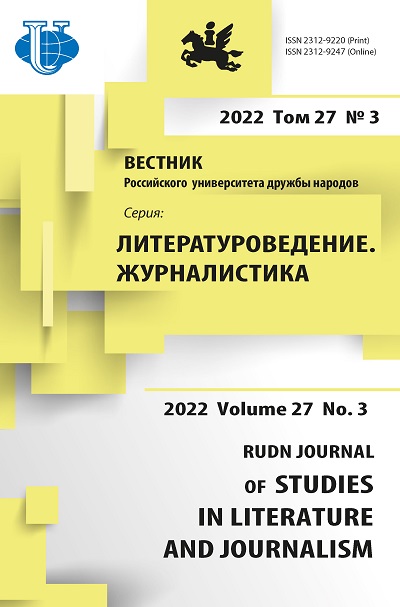Diasporic consciousness in contemporary Indian women’s fiction in English: at a glance
- Authors: Kadam D.M.1
-
Affiliations:
- Rajarambapu Institute of Technology
- Issue: Vol 27, No 3 (2022)
- Pages: 532-540
- Section: LITERARY CRITICISM
- URL: https://journals.rudn.ru/literary-criticism/article/view/32306
- DOI: https://doi.org/10.22363/2312-9220-2022-27-3-532-540
- ID: 32306
Cite item
Full Text
Abstract
Diasporic literature is a pivotal term in literature that includes the literary works of the authors who are the outsiders for their native country but their work is deeply rooted in homeland by reflecting native culture, background, displacement and so on. Indian women’s literary work is at the forefront of diasporic literature. The advent of Indian women novelists on the literary horizon is an important development in the Indian English literature. These women writers have also contributed to other genres, such as drama, poetry and short stories, not only in English but also in regional languages like Hindi, Marathi, Bengali, Punjabi, Tamil, Kannada and so on. Some modern women writers flourish their writing in the form of fables as a literary genre in an impressive way to focus on the specific themes. In last two decades, Indian women’s writing in English is blossomed, both published in India and abroad. The present paper is the review of diasporic consciousness in select works of contemporary Indian women novelists. It focuses on the attempt to highlight the quest for identity of those women who played a crucial role in defining themselves through their literary work in diasporic background.
About the authors
Dipali M. Kadam
Rajarambapu Institute of Technology
Author for correspondence.
Email: dipali.kadam@ritindia.edu
Professor of the Sciences and Humanities Department Rajaramnagar, Republic of India
References
- Agrawal, A. (2014). Faith versus science: A study of Kamla Makandaya’s ‘A Silence of Desire.’ Research Scholar.
- Alam, F. (1996). Bharati Mukherjee. New York: Twayne Publishers.
- Alexander, M. (2003). Fault lines: A memoir. The Feminist Press, City University of New York.
- Arthur, J.A. (2010). African diaspora identities: Negotiating culture in transnational migration. Lexington Books.
- Ashcroft, B., Griffiths, G., & Tiffin, H. (2007). Post-colonial studies the key concepts (2nd ed., pp. 61-62). London, New York: Routledge.
- Bhabha, H.K. (1994). The location of culture. London: Routledge.
- Dasan, A.S. (2006). The rains and the roots: The Indian English novel then and now. Mysore: Sahrdayata-Global Fellowship Academy.
- Docker, J. (2001). The poetics of diaspora. London: Continuum.
- Gore, P. (2013). Diasporic experiences in Jhumpa Lahiri’s the Namesake. Journal of Higher Education and Research Society, 1(1), 27.
- Gouse, Md.S. (2017). Diasporic dimension and identity issues in Jhumpa Lahiri’s “The Namesake.” Indian Scholar.
- Kadam, M.G. (2008). The Namesake: A mosaic of marginality, alienation, nostalgia and beyond. In N. Das (Ed.), Jhumpa Lahiri: Critical Perspectives (pp. 121-122). New Delhi: Pencraft.
- Kumari, A. (2014). The matrix of diasporic consciousness in Chitra Banerjee “Divakaruni’s Arranged Marriage.” International Journal on Studies in English Language and Literature, 2(11), 59-64.
- Nagabhushanam, N. (2019). Meena Alexander as a diaspora writer. International Journal of Research, VIII(I), 186.
- Naik, M.K. (1985). Perspectives on Indian fiction in English. New Delhi: Abhinav Publications.
- Naik, M.K. (2006). A history of English literature. Delhi: Sahitya Akademi.
- Paranjape, M. (2003). Writing across Boundaries: South Asian diasporas and homelands. In M. Fludernik (Ed.), Diaspora and Multiculturalism: Common Traditions and New Developments (pp. 231-260). Rodopi
- Parаmeswaran, U. (1998). Trishanku and other writings. In Gauri Shankar Jha (Ed.), Current Perspectives in Indian English Literature. New Delhi: Prestige Books.
- Rushdie, S. (1991). Imaginary homelands: Essays and criticism, 1981-1991. London: Granta Books.
- Safran, W. (1991). Diasporas in modern societies: Myths of homeland and return. Diaspora: A Journal of Transnational Studies, 1(1), 83-99. http://doi.org/10.1353/dsp.1991.0004
- Sahoo, A. (2014). Diaspora, transnationalism and development. In S. Erudaya Rajan (Ed.), India Migration Report 2014. New Delhi: Routledge Publications.
- Taylor, C. (1992). Sources of the self: The making of the modern identity. Cambridge University Press.
- Vijayasree, C (2001). Suniti Namjoshi: The artful transgressor. New Delhi: Rawat Publications.
Supplementary files















